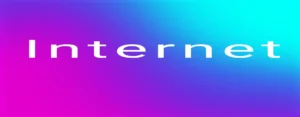INTERNET
The internet has indelibly transformed the fabric of modern society, permeating every facet of our daily lives, from communication and education to commerce and entertainment. It has revolutionized the way we interact, breaking down geographical barriers and creating a global village where information is readily accessible and instantaneous. This unprecedented connectivity has fostered a new era of globalization, enabling individuals and businesses to collaborate and compete on an international scale. The proliferation of social media platforms has redefined social interactions, allowing people to maintain relationships regardless of physical distance and providing a forum for the exchange of ideas and cultures. However, this hyper-connectivity also brings challenges, such as the spread of misinformation and the erosion of privacy, which require careful navigation and regulation.

One of the most profound impacts of the internet is its democratization of information. In the pre-internet era, access to information was largely restricted to those who had physical access to libraries or could afford books and subscriptions to journals. Today, a vast repository of knowledge is available at our fingertips, accessible through search engines and online databases. Educational resources have been revolutionized, with platforms like Khan Academy, Coursera, and edX offering courses from prestigious institutions to anyone with an internet connection. This has opened up new opportunities for lifelong learning and skill development, empowering individuals to pursue their interests and careers without the constraints of traditional educational systems.
The internet has also transformed the business landscape, giving rise to the digital economy. E-commerce giants like Amazon and Alibaba have reshaped retail, making it possible to buy and sell goods and services online, often at lower prices and with greater convenience than traditional brick-and-mortar stores. The gig economy, facilitated by platforms like Uber, Airbnb, and Fiverr, has created new forms of employment and income generation, allowing people to offer their services on a flexible basis. Moreover, the internet has enabled small businesses and entrepreneurs to reach a global audience, leveling the playing field and fostering innovation and competition.
Social media has been a double-edged sword in the internet era. On one hand, it has provided a powerful platform for social movements and political activism, giving voice to marginalized communities and facilitating the organization of protests and campaigns. Movements such as #BlackLivesMatter and #MeToo have harnessed the power of social media to raise awareness and drive social change. On the other hand, social media has also been criticized for contributing to the spread of misinformation, echo chambers, and polarization. Algorithms that prioritize engagement can inadvertently amplify divisive content, creating filter bubbles where users are only exposed to information that reinforces their existing beliefs. This can hinder constructive dialogue and compromise the quality of public discourse.
Privacy concerns are another significant issue in the digital age. The vast amount of personal data generated and collected online has led to increased surveillance by both corporations and governments. Companies use this data for targeted advertising, often without users’ explicit consent, raising ethical questions about data ownership and consent. High-profile data breaches and scandals, such as the Cambridge Analytica incident, have highlighted the vulnerabilities in our digital infrastructure and the need for robust data protection regulations. Governments, too, have exploited the internet for surveillance purposes, sometimes justifying it in the name of national security. Balancing the benefits of connectivity with the need to protect individual privacy remains a critical challenge.
The internet has also reshaped the entertainment industry, with streaming services like Netflix, Spotify, and YouTube changing the way we consume media. Traditional forms of entertainment, such as television and radio, have had to adapt to the on-demand, personalized nature of digital content. These platforms have given rise to new forms of creativity and expression, allowing independent creators to reach large audiences without the need for traditional gatekeepers. However, this shift has also disrupted established industries, leading to job losses and changes in how content is produced and monetized.
In the realm of communication, the internet has made it easier to stay in touch with friends and family, regardless of distance. Messaging apps like WhatsApp, Telegram, and Signal offer instant communication, while video conferencing tools like Zoom and Skype have become indispensable, especially during the COVID-19 pandemic. The ability to communicate in real-time has strengthened personal and professional relationships, making collaboration more efficient and effective. However, the constant connectivity can also lead to information overload and digital burnout, as individuals struggle to disconnect from work and social obligations.
The impact of the internet on society is not uniformly positive or negative; it is complex and multifaceted. While it has undoubtedly brought about significant advancements and opportunities, it has also introduced new challenges that need to be addressed. As we move forward, it is crucial to leverage the benefits of the internet while mitigating its risks. This requires a concerted effort from governments, businesses, and individuals to promote digital literacy, protect privacy, and foster an inclusive and equitable digital environment.
In conclusion, the internet has become an integral part of modern life, transforming how we access information, conduct business, interact socially, and entertain ourselves. Its influence will continue to grow as technology evolves, offering new possibilities and challenges. By understanding and addressing the complexities of the internet’s impact, we can harness its potential to create a more connected, informed, and empowered society.
This essay covers various aspects of the internet’s impact on society, including democratization of information, transformation of business and commerce, social media, privacy concerns, and changes in communication and entertainment.
